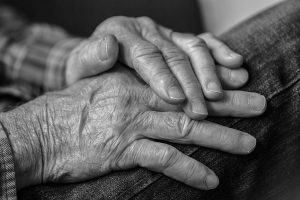There have been lots of articles written about aging – how to age well and to prevent physical and mental problems. Dementia is a big concern, as are physical problems that effect the aging population. Normal aging takes a toll on all of us.
 As we age, our bodies break down. We are unable to do what we did even 10 years before. As a result, many senior adults seek medical treatment for their physical problems. But they rarely talk about the depression and anxiety that accompany this.
As we age, our bodies break down. We are unable to do what we did even 10 years before. As a result, many senior adults seek medical treatment for their physical problems. But they rarely talk about the depression and anxiety that accompany this.
They are prescribed medications to help with the physical problems, including opioids and other narcotics. Instead of medical help, some turn to alcohol and marijuana to ease the pain.
Common Aging Issues
Depression
There are so many factors that play into depression that are often overlooked by caregivers and loved ones. Physical impairment and social isolation are two factors. But things like long-term illness, changes in the environment such as moving into assisted living, the loss of a loved one, medication interactions, and addictions all play a role in increased depression.
 Many older people deny that they are experiencing depression or anxiety, but caregivers need to be aware that it’s an issue that affects more and more elderly people. Older white males are especially prone to depression and the suicide rate among them is quite high.
Many older people deny that they are experiencing depression or anxiety, but caregivers need to be aware that it’s an issue that affects more and more elderly people. Older white males are especially prone to depression and the suicide rate among them is quite high.
Dementia
Much has been written about dementia and its effects on an individual. Changes in mood, forgetfulness, and confusion about things or conversations are some of the indicators. Being aware of these things will help in diagnosing any changes in mental ability.
Anxiety
There are other mental health issues to be aware of. Anxiety can be a real problem for people, and can range from mild fears to obsession-compulsive behaviors such as hoarding to post traumatic stress.
Even people who have never struggled with depression or anxiety can develop these as they age. Caregivers should be aware of any changes in behavior or mood that could be signs of mental health issues:
- A sad or depressed mood lasting longer than a couple of weeks
- Social withdrawal and loss of interest in things that were once enjoyable
- Memory loss – more than the normal “Where did I put my keys?”
- Inappropriate guilt, feelings of helplessness
- Unexplained fatigue or changes in weight and eating habits
- Thoughts of suicide
- Changes in dress – less care taken with appearance
- Physical changes such as aches and pains with no known cause
Late Onset Bipolar Disorder
 In addition, it’s possible to develop late onset bipolar disorder, which often looks like or mimics other problems. It can include agitation, manic behavior, and delusions. (It’s also important that physical causes for these behaviors be ruled out first, such as urinary tract infections. These have been known to cause behavior changes such as agitation, mania, and confusion in the elderly.)
In addition, it’s possible to develop late onset bipolar disorder, which often looks like or mimics other problems. It can include agitation, manic behavior, and delusions. (It’s also important that physical causes for these behaviors be ruled out first, such as urinary tract infections. These have been known to cause behavior changes such as agitation, mania, and confusion in the elderly.)
Late Onset Schizophrenia
Another possible mental health problem is late onset schizophrenia, which tends to be milder than when it occurs in younger adults, but includes symptoms similar to dementia. It can also include hallucinations and paranoia.
Alcohol and Substance Abuse
Use and abuse of prescription drugs, including pain meds and opioids can also effect the older adult. There is an upswing in this kind of abuse of meds in recent years, and this can account for some of the signs above. As we age, many of us require more medications to control various symptoms, and these are easy to abuse or misuse.
 As we age, we become more susceptible to the problems listed above. Caregivers need to be aware of changes in their older family members and should not assume that it’s just age. Untreated UTI’s have been known to cause delusions and hallucinations, as well as confusion and changes in personality.
As we age, we become more susceptible to the problems listed above. Caregivers need to be aware of changes in their older family members and should not assume that it’s just age. Untreated UTI’s have been known to cause delusions and hallucinations, as well as confusion and changes in personality.
If signs like those listed above appear in an older adult, a complete physical is the first step to ruling out any physical problems that may cause these behaviors. Once that’s been done, the next step is to get a diagnosis from a competent mental health professional.
Although it’s sometimes difficult to get older adults into therapy, talking with a mental health counselor can help.
“St. Catherine of Alexandria Church,” courtesy of Dimitris Kamaras, Flickr Creative Commons, CC0 License; “San Antonio,” courtesy of David, Flickr Creative Commons, CC0 License; “Hands,” courtesy of Robert Douglass, Flickr Creative Commons, CC0 License; “Bird,” courtesy of Canned Muffin, Flickr Creative Commons, CC0 License


